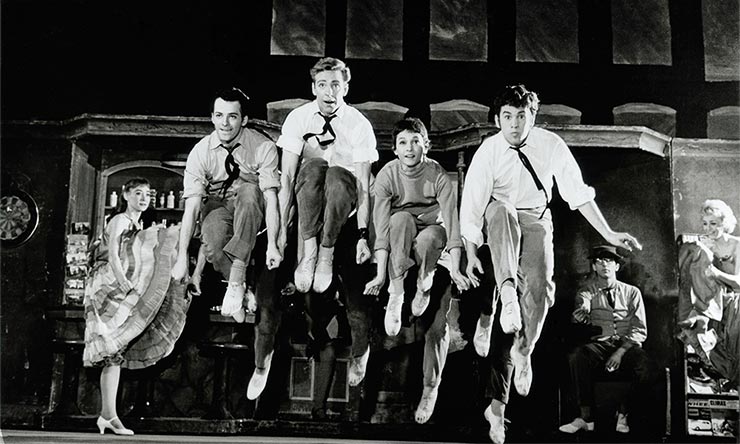Stephen Sondheim: a legend who lives on
Eight-time Tony Award and eight-time Grammy Award winning composer and lyricist Stephen Sondheim died on Nov. 26, 2021, at age 91.
Stephen Sondheim, an American composer and lyricist, started his theater career by writing the lyrics for “West Side Story” in 1957. The eight-time Tony Award winner died on Nov. 26, 2021, at age 91. (Image via Wikimedia Commons)
November 30, 2021
A few days have passed since composer and lyricist Stephen Sondheim’s sudden death at age 91, and I am still struggling to make sense of my grief. I grew up with Sondheim. I sang “Rose’s Turn” around my kitchen. I danced to “West Side Story.” I decided that “Sweeney Todd: The Demon Barber of Fleet Street” was my favorite musical at the ripe age of 10. The eight-time Tony Award winner’s music eased my worries and taught me what it means to be alive in a world like ours. Knowing that the man behind the American musical will no longer get behind a grand piano, I am left with questions. How do I deal with this emptiness? How do I honor someone who has contributed so much in a short obituary? How do we move forward?
Sondheim wrote, “Sometimes people leave you … do not let it grieve you / No one leaves for good.” Look around: So much of Sondheim is still alive. “Company” is playing at the Bernard B. Jacobs Theatre, “Assassins” is playing at Classic Stage Company, the “West Side Story” movie premieres Dec. 10 and the Stephen Sondheim Theatre lies on West 43rd Street. And so, with his death occurring the day after Thanksgiving, I feel as if Sondheim would not want us to mourn his loss, but rather to be thankful for the joys he contributed to our lives over the years.
We live in a world filled with noise: fighting, jealousy, illness, loneliness, insecurity, misunderstanding — the list goes on. And yet, Sondheim somehow found a way to turn this noise into music, teaching audiences that everyone everywhere experiences these emotions and situations. “Company” illustrates what it means to be afraid of commitment, especially when the clock is ticking. “West Side Story” demonstrates how societal greed and prejudice are the only forces that can destroy true love. “Assassins” and “Sweeney Todd” display how each person has the potential to unleash his darker side when faced with injustice. Sondheim had a talent for making us see ourselves in all sorts of characters, even ones who slit throats and assassinate presidents. His musicals act as cautionary tales, often forcing us to confront our flaws and equip ourselves with the tools to handle them.
People continue to produce these musicals and sing these songs because Sondheim understood the core of what it means to be human: We want to feel loved. Amid endless conflict, love is the remedy. If we learned to accept each other’s differences, there would be no star-crossed lover tragedies or witches with curses. Sondheim emphasizes how love is the solution in each of his musicals, and so his work is timeless because we can never love too much in a world filled with hatred.
Sondheim was mentored by lyricist Oscar Hammerstein II — most known for “Sound of Music,” “Carousel” and “Oklahoma!” — and admitted to feeling as if he owed his success to Hammerstein. However, Sondheim spent his entire career paying it forward. Without “Into the Woods,” “Gypsy” and “A Funny Thing Happened on the Way to the Forum,” there would be no Jonathan Larson and “Tick, Tick… Boom,” James Lapine or Lin-Manuel Miranda. Regardless of how old you are, we remember growing up listening to Sondheim’s music in the car and performing his shows in our high school musicals. Sondheim’s contributions shaped us as people for decades, influencing both our music taste and the ways we choose to share our talents with the world each day.
And now, here we are in November 2021, left uncertain about the future of musical theater. Of course, there will be Sondheim tributes and revivals, but who will rise to the occasion of writing the next great work that will fill theater seats and inspire singalongs? Who knows? But one thing is certain: The unknown is exciting. There is much to be tried, explored and created, and if we are too afraid to embrace it, we will overlook people who are as inspiring as Sondheim. With that said, today is a new beginning — a chance to welcome the next generation of talent to the stage. Or, as Sondheim wrote in “Sunday in the Park with George,” think of tomorrow as “White / A Blank page or canvas / So many possibilities.”
























































































































































